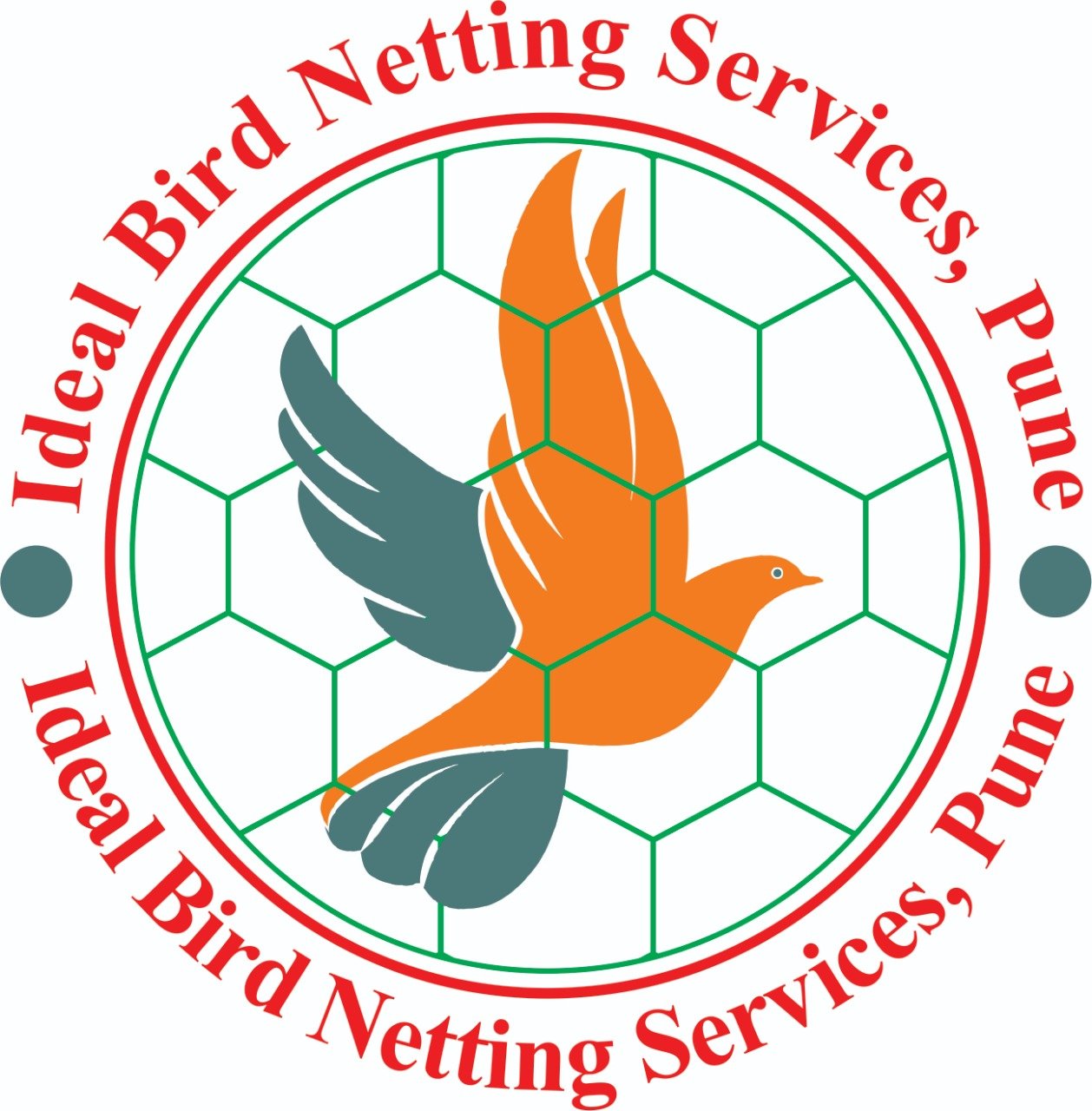A Solution for Every Bird Problem in Pune
Not all bird problems are the same. This guide from Ideal bird Netting services explains our specialized netting solutions for Pune’s most common nuisance birds: pigeons, crows, and sparrows.
Beyond Pigeons: Identifying Your Specific Bird Problem
When Pune residents think of “bird netting,” they’re usually thinking about pigeons on their balcony. While pigeons are the most common issue, other birds like crows and sparrows can cause different, and sometimes more serious, problems. A one-size-fits-all approach doesn’t work. Ideal Bird Netting services.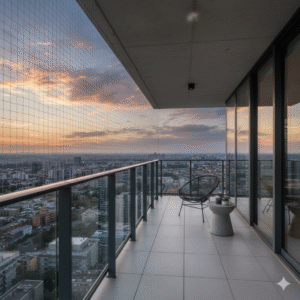
At Ideal, we are comprehensive bird control experts. We assess your specific situation and provide the right type of netting to solve your problem effectively and humanely. Understanding the difference is key to a successful, long-term solution.
Our Tailored Bird Netting Solutions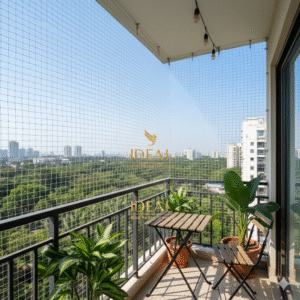
The Pigeon Problem: Hygiene and Mess
This is the most frequent complaint in Pune’s residential societies. Pigeons take over balconies, leaving behind corrosive droppings that pose health risks and ruin your outdoor space.
Our Solution: Standard Pigeon Netting pune
- Material: Durable, UV-stabilized HDPE Net
- Mesh Size: 1.5 to 2 inches (Standard)
- Best For: Residential balconies, windows, and building ducts.
- Result: A clean, hygienic, and fully usable balcony, free from pigeon menace.
The Crow Problem: Damage and Aggression
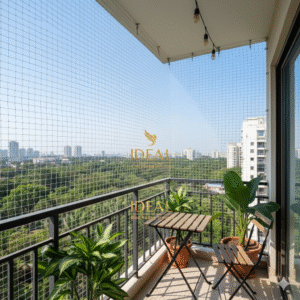
Here’s an image depicting durable, high-quality bird netting on a balcony, similar to what you might expect from a reputable manufacturer like Garware. The focus is on a strong, well-tensioned net that effectively blends with the structure while providing robust bird deterrence.
Crows are intelligent, strong, and can be destructive. They are known for scattering garbage on terraces, damaging solar panels, and can be aggressive, especially in open-air dining areas or commercial spaces.
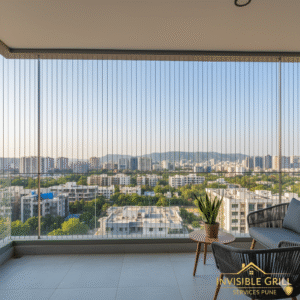
Our Solution: Heavy-Duty Crow Netting
- Material: High-strength, thicker gauge HDPE Net
- Mesh Size: 2 inches (Standard to Large)
- Best For: Open terraces, restaurant rooftops, industrial areas, and properties near large trees.
- Result: A robust barrier that withstands the strength of larger birds and protects your property from damage.
The Sparrow Problem: Infiltration and Fire Hazards
Sparrows and other small birds, while seemingly harmless, can get into tiny gaps. They often build nests inside AC ducts, exhaust vents, and industrial sheds, which can block ventilation and create serious fire hazards.
Our Solution: Small-Mesh Sparrow Proofing
- Material: Specialized, fine HDPE Net
- Mesh Size: 1 inch (Small)
- Best For: Industrial sheds, warehouses, ventilation shafts, and any area where small bird entry is a concern.
- Result: Complete exclusion of small birds, preventing nesting in critical and dangerous areas.
The Ideal Promise: Quality Across All Solutions
No matter which type of bird you’re dealing with, our commitment to quality remains the same. Every installation from Ideal includes:
- The Right Net for the Job: We’ll correctly identify your bird problem and use the appropriate mesh size.
- 100% Rust-Proof Fittings: We use only stainless steel fixtures to ensure a long, stain-free life for your installation.
- Professional & Secure Installation: Our expert team ensures the net is perfectly tensioned and leaves no gaps.
Not Sure Which Bird Problem You Have?
Let our experts help. Contact Ideal today for a free on-site inspection in Pune. We’ll identify the nuisance bird and recommend the most effective and humane netting solution.
Understanding Bird Problems in Pune
Pune, a vibrant city in India, is not just known for its historical significance and educational institutions; it also faces a myriad of bird-related issues that pose challenges to its residents. Birds in urban settings, while an essential part of the ecosystem, can also be a source of significant concern. Among the various bird problems prevalent in Pune, health risks are foremost. Flocks of birds, particularly pigeons, can carry diseases that may lead to serious health implications for the population. Diseases such as histoplasmosis, cryptococcosis, and West Nile virus are often associated with bird droppings, necessitating vigilance from the community.
Property damage is another pertinent issue arising from bird infestations. The presence of large populations of birds can result in significant structural damage to buildings, vehicles, and public installations. Bird droppings are not only unsightly but can also lead to corrosion and deterioration of surfaces. Moreover, nests and debris can clog drainage systems and create further complications for infrastructure maintenance.
Disturbances caused by birds should also be considered. The noise generated by large flocks of birds, particularly at dawn and dusk, can disrupt the peace in residential areas. This auditory nuisance often leads to frustration and dissatisfaction among residents, adversely affecting their quality of life. Additionally, aggressive behavior from some bird species, especially during the nesting season, can pose risks to both children and pets.
Common bird species causing these problems in Pune include pigeons, crows, and mynas. Each of these birds plays a unique role within the urban ecosystem, but their adaptation to city life often results in conflicts with human inhabitants. Addressing these issues is crucial for ensuring community well-being and maintaining a balanced relationship between urban dwellers and the avian population.
Identifying the Types of Bird Problems
Residents of Pune often face various challenges related to bird-related issues, each of which has distinct implications for both homes and businesses. One significant problem is the excessive accumulation of bird droppings. This issue is not merely an aesthetic concern; bird droppings are highly acidic and can cause significant damage to buildings and vehicles, leading to costly repairs. The droppings create a breeding ground for harmful pests and can also produce unpleasant odors, which can deter customers or visitors in commercial settings.
Another prevalent concern is noise pollution caused by certain bird species. Birds such as pigeons and crows can create substantial disturbances with their constant cooing or cawing, particularly around sunrise and sunset. This intrusion can be disruptive for families and individuals seeking peace, as well as for businesses that rely on a quiet environment for customer satisfaction. Understanding this issue is crucial for finding solutions that allow for a harmonious coexistence with local wildlife.
Nesting in undesired areas presents yet another challenge. Birds frequently choose rooftops, balconies, and signs as nesting sites, leading to inconveniences for homeowners and business owners alike. The risk of nesting in these locations can result in blocked drainage systems and increased pest activity, potentially escalating into larger problems if not addressed promptly. Moreover, there is also a significant concern regarding potential disease transmission. Birds can carry pathogens and parasites that may affect human health. For instance, diseases like histoplasmosis and psittacosis can be a stark reality for those living or working near large bird populations.
Each of these bird-related problems highlights the need for proactive measures and effective solutions tailored to the unique environment of Pune. By recognizing these issues, individuals can begin to implement strategies that mitigate their impact while fostering a sustainable relationship with avian species.
The Importance of Bird Control Solutions
Effective bird control solutions are crucial for various reasons, particularly in urban areas like Pune, where human-bird interactions are common and can lead to significant challenges. One of the primary benefits of implementing a comprehensive bird control plan is the protection of property values. Birds can cause extensive damage to buildings, vehicles, and agricultural lands due to their nesting habits and waste. This damage can result in costly repairs and decreased property appeal, ultimately affecting the overall real estate market.
Additionally, the health and safety implications of bird populations should not be overlooked. Many species of birds can act as vectors for diseases that may affect both humans and pets. For instance, droppings can harbor harmful pathogens, leading to respiratory issues and other health risks if left unmanaged. By investing in humane bird control solutions, communities can mitigate these health risks, ensuring a safer environment for residents, visitors, and local wildlife alike.
Moreover, effective bird management plays a vital role in minimizing damage to infrastructure. Birds often nest in hard-to-reach areas, leading to blockages in gutters and ducts, which can interfere with proper drainage and ventilation. Regular maintenance and strategic control measures help prevent these issues, thus prolonging the lifespan of buildings and reducing long-term maintenance costs.
Ethical considerations are paramount when discussing bird control. It is essential to advocate for humane methods that minimize harm to the bird population while addressing the concerns of local communities. Utilizing deterrents, habitat modifications, and exclusion techniques allows for a balanced approach that considers the welfare of birds, thereby fostering coexistence between wildlife and human settlement.
In conclusion, implementing effective bird control solutions is vital for protecting property, safeguarding public health, minimizing infrastructure damage, and ensuring humane treatment of birds. Communities in Pune can benefit greatly from proactive measures that address these challenges.
Innovative Bird Control Solutions for Pune
As urban areas like Pune continue to expand, bird-related issues have escalated, necessitating the development and implementation of innovative bird control solutions. These methods not only aim to manage the population of birds in a humane way but also protect properties and public health. Several effective strategies can be considered, each tailored to specific circumstances.
One of the most widely recognized techniques is bird netting. This method involves the installation of durable nets that physically prevent birds from accessing certain areas, such as balconies, warehouses, and commercial buildings. Bird netting is particularly effective in environments where birds pose a risk to crops or stored goods. The nets are designed to be virtually invisible from a distance, maintaining the aesthetic quality of the environment while providing effective protection.
Visual deterrents represent another innovative approach, utilizing reflective surfaces, decoy predators, or inflatable devices to dissuade birds from inhabiting certain areas. These deterrents can be especially useful in open spaces, parks, and commercial complexes, where their movement can create disturbances. Proper placement and periodic rotation of these devices can enhance their effectiveness, as birds can become accustomed to static deterrents over time.
Sound deterrents, such as ultrasonic devices or recorded distress calls, can also play a significant role in bird control. These solutions leverage the natural aversion of birds to specific sounds, creating an unwelcoming environment. They are most effective in large outdoor areas where birds tend to gather. However, the effectiveness of sound-based solutions may diminish in busy urban settings where noise pollution is prevalent.
Lastly, environmental modifications can significantly impact bird behavior. By altering the landscape through landscaping choices, waste management practices, and the elimination of standing water, areas can be made less attractive to birds. This holistic approach not only reduces the population of birds in the area but also fosters a more balanced ecosystem.
Choosing the Right Solution for Your Needs
When addressing bird problems in Pune, selecting the most suitable bird control solution is pivotal to effectively managing the situation. Various factors must be considered to ensure that the chosen method aligns with the specific circumstances of each case. One key component is identifying the type of bird causing the issue. Different species exhibit distinct behaviors and patterns; thus, their management may require varied approaches. For instance, pigeons and crows might necessitate different control strategies due to their unique nesting habits and feeding preferences.
Another critical factor to assess is the severity of the infestation. A minor nuisance may be effectively resolved through simple deterrents, such as visual or auditory repellents. Conversely, a significant infestation may call for a more robust method, such as professional intervention or the installation of physical barriers. Understanding the extent of the problem allows for better resource allocation and can prevent the escalation of the issue, ultimately protecting property and health.
The type of property also plays a vital role in determining the right solution. Residential areas might allow for different control measures compared to commercial properties or public spaces. Additionally, if the property is situated in an area with specific ecological considerations, these factors must be integrated into the decision-making process to ensure compliance with local regulations and environmental protection laws.
Potential legal regulations concerning bird control can further complicate the selection process. In many regions, certain bird species are protected under wildlife conservation laws, necessitating careful consideration and perhaps the involvement of licensed professionals. Conducting a thorough assessment of the unique circumstances surrounding your bird problem, encompassing the aforementioned factors, will ultimately guide you in choosing the most effective bird control solution tailored to your needs.
DIY vs. Professional Bird Control Services
When facing bird-related issues in Pune, individuals often face the choice between implementing DIY bird control methods and hiring professional services. Each approach offers distinct advantages and disadvantages that can significantly impact the effectiveness of bird management strategies.
One of the primary advantages of DIY bird control is cost-effectiveness. Homeowners can often implement various strategies such as using bird nets, spikes, or visual deterrents without incurring substantial expenses. Additionally, multiple online resources provide guidance on effective DIY techniques, making it accessible for individuals willing to invest time and effort into solving their bird problems. However, this approach requires a certain level of expertise and understanding of bird behavior, which may pose challenges. Improper application of DIY methods can lead to inadequate results, potentially exacerbating the issue or causing harm to the birds, which is both unethical and counterproductive.
On the other hand, hiring professional bird control services in Pune ensures that experts handle the situation. Professionals bring extensive knowledge and experience in dealing with various bird species, allowing for tailored solutions that effectively address specific problems. Their understanding of local regulations and best practices can also ensure compliance and promote humane treatment of birds. However, the primary drawback of professional services is the associated costs, which can be considerable depending on the severity of the issue and the methods employed.
Ultimately, the choice between DIY methods and professional services depends on the specific circumstances and personal preferences. Homeowners must weigh the potential cost savings and convenience of DIY methods against the expertise and thoroughness offered by professional services. A balanced approach can empower individuals to choose a bird control strategy that best fits their needs while remaining mindful of ethical considerations and effectiveness.
Real-Life Success Stories in Pune
The challenges posed by bird infestations in urban settings, especially in a bustling city like Pune, are all too familiar to many residents. However, the solutions implemented by these individuals have not only resolved their immediate concerns but also provided long-lasting benefits. One notable case is that of a family residing near the Pune University campus who struggled with a persistent crow problem. The incessant cawing and nesting on their balcony disrupted their peace, leading to a gradual decision to seek assistance. They discovered the effectiveness of installing bird-proof nets, which successfully discouraged the crows from approaching their living space. As a result, the family enjoyed a quieter home and a newfound sense of tranquility.
Another remarkable instance involved a local café owner in the bustling neighborhood of Koregaon Park. The café faced challenges because of the large number of pigeons that flocked to their outdoor seating area, which discouraged customers. After extensive research, the owner decided to implement a combination of visual deterrents and natural repellents. The installation of owl decoys, combined with the strategic placement of cinnamon oil, significantly reduced the pigeon population around the café. This not only improved the dining experience for patrons but also created a cleaner environment, enhancing the café’s reputation.
Residents in the area of Kalyani Nagar also shared their success story regarding sparrows that were nesting in the eaves of their homes. They opted for humane trapping and relocation methods, carefully ensuring the sparrows were moved to a suitable area. This proactive approach not only protected their property but also allowed the family to appreciate the importance of birds in the ecosystem while reflecting on the positive outcomes of their actions.
These real-life case studies exemplify how various bird control methods can lead to successful resolutions. By adopting strategic and ethical approaches, Pune residents have transformed their experiences with local bird populations, ultimately enjoying improved environments and heightened quality of life.
Maintaining Long-term Bird Management
Effective long-term bird management is crucial in maintaining balance in urban ecosystems, particularly in Pune, where bird populations can become problematic if not monitored adequately. After implementing initial control measures, it is essential to have a structured maintenance plan to ensure that these solutions remain effective over time. Regular monitoring of bird populations enables early detection of any resurgence in problematic species, making prompt action feasible.
Seasonal variations must also be considered as they can significantly impact bird activity and behaviors. For instance, during nesting season, specific control measures might need to be adjusted to protect young birds while still managing populations effectively. An understanding of local nesting patterns and migration behaviors can inform the timing of maintenance efforts, ensuring that interventions are targeted and respectful of wildlife regulations.
Proactive strategies play a key role in preventing future bird issues in urban settings. This includes alterations to structural features of buildings, such as the installation of bird spikes and nets, which can dissuade birds from roosting in undesirable locations. Furthermore, simplifying and tidying landscapes by removing food sources or nesting materials helps to discourage birds from settling in certain areas. Regular inspections and maintenance of these deterrent measures are vital to their continued effectiveness.
In addition, community engagement initiatives can foster an understanding of local biodiversity, encouraging residents and businesses to participate in bird management efforts. By collaborating on educational campaigns, individuals can learn about species in the area, their behaviors, and the significance of maintaining population control. Ultimately, comprehensive ongoing management paired with community involvement lays the groundwork for sustainable bird management solutions in Pune.
Frequently Asked Questions About Bird Problems in Pune
Residents of Pune often encounter various challenges related to bird problems, and naturally, questions arise regarding appropriate solutions and management strategies. One common concern is the legality of controlling bird populations. In India, certain bird species are protected under the Wildlife Protection Act, which restricts methods employed to control their numbers. It is vital for individuals to familiarize themselves with local regulations, ensuring compliance while addressing their specific bird-related issues.
Another area of inquiry pertains to the safety of bird control methods. Homeowners frequently seek reassurance regarding the use of bird deterrents, such as nets, spikes, and sonic repellents. Most of these solutions, when implemented correctly, pose minimal risk to both the birds and humans. However, it is advisable to select humane methods that do not harm the birds, ensuring an ethical approach to bird management.
The effectiveness of various deterrents also raises questions among residents. While some individuals may find success with visual repellents like reflective surfaces or decoys, others may prefer auditory deterrents such as bird distress calls. It is important to understand that effectiveness may vary based on the bird species involved and the specific environmental context. A combination of methods often leads to better results.
Best practices for continuous bird management involve regular monitoring and maintenance of deterrents to ensure they remain effective over time. Additionally, property owners are encouraged to keep their surroundings clean and free from food sources that attract birds, as this can significantly reduce the likelihood of infestations. Collaboration with local wildlife control professionals is also recommended for tailored solutions and expert guidance on managing bird-related concerns effectively.
